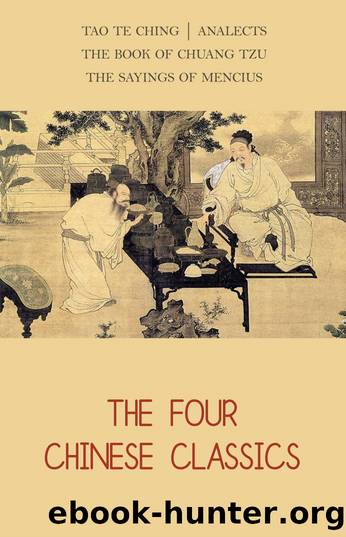The Four Chinese Classics by Lao Tzu

Author:Lao Tzu
Language: eng
Format: epub
Publisher: Pandora's Box
Published: 2018-11-20T00:00:00+00:00
7: Tzu-kung seeing Lao Tzu
Tzu-kung said,
âSo then, can (this) man indeed sit still as a representative of the dead, and then appear as the dragon? Can his voice resound as thunder, when he is profoundly still? Can he exhibit himself in his movements like heaven and earth? May I, Zhze, also get to see him?â
Accordingly with a message from Confucius he went to see Lao Tan.
Lao Tan was then about to answer (his salutation) haughtily in the hall, but he said in a low voice,
âMy years have rolled on and are passing away, what do you, Sir, wish to admonish me about?â
Tzu-kung replied,
âThe Three Kings and Five Tis ruled the world not in the same way, but the fame that has accrued to them is the same. How is it that you alone consider that they were not sages?â
âCome forward a little, my son. Why do you say that (their government) was not the same?â
âYao,â was the reply, âgave the kingdom to Shun, and Shun gave it to Yü. Yü had recourse to his strength, and Tang to the force of arms. King Wän was obedient to Kâu (-hsin), and did not dare to rebel; king Wu rebelled against Kâu, and would not submit to him. And I say that their methods were not the same.â
Lao Tan said,
âCome a little more forward, my son, and I will tell you how the Three Hwangs and the Five Tis ruled the world. Hwang-Ti ruled it, so as to make the minds of the people all conformed to the One (simplicity). If the parents of one of them died, and he did not wail, no one blamed him. Yao ruled it so as to cause the hearts of the people to cherish relative affection. If any, however, made the observances on the death of other members of their kindred less than those for their parents, no one blamed them. Shun ruled it, so as to produce a feeling of rivalry in the minds of the people. Their wives gave birth to their children in the tenth month of their pregnancy, but those children could speak at five months; and before they were three years old, they began to call people by their surnames and names. Then it was that men began to die prematurely. Yü ruled it, so as to cause the minds of the people to become changed. Menâs minds became scheming, and they used their weapons as if they might legitimately do so, (saying that they were) killing thieves and not killing other men. The people formed themselves into different combinations; â so it was throughout the kingdom. Everywhere there was great consternation, and then arose the Literati and (the followers of) Mo (Ti). From them came first the doctrine of the relationships (of society); and what can be said of the now prevailing customs (in the marrying of) wives and daughters? I tell you that the rule of the Three Kings and Five Tis may be called by that name, but nothing can be greater than the disorder which it produced.
Download
This site does not store any files on its server. We only index and link to content provided by other sites. Please contact the content providers to delete copyright contents if any and email us, we'll remove relevant links or contents immediately.
| Confucianism | Feng Shui |
| I Ching | Jainism |
| Karma | Shintoism |
| Sikhism | Tao Te Ching |
| Taoism | Tibetan Book of the Dead |
| Zoroastrianism |
The Tao of Physics by Fritjof Capra(2276)
Human Design by Chetan Parkyn(2073)
The Diamond Cutter by Geshe Michael Roach(2062)
Feng Shui by Stephen Skinner(1940)
The Alchemy of Sexual Energy by Mantak Chia(1860)
Tao Te Ching by Lao Tzu(1842)
365 Tao: Daily Meditations by Ming-Dao Deng(1622)
Tao Tantric Arts for Women by Minke de Vos(1599)
Sun Tzu's The Art of War by Giles Lionel Minford John Tzu Sun(1541)
Sidney Sheldon (1982) Master Of The Game by Sidney Sheldon(1520)
Buddhism 101 by Arnie Kozak(1513)
Karma-Yoga and Bhakti-Yoga by Swami Vivekananda(1495)
The Analects of Confucius by Burton Watson(1436)
The Art of War Other Classics of Eastern Philosophy by Sun Tzu Lao-Tzu Confucius Mencius(1428)
Tao te ching by Lao Tzu(1366)
The Way of Chuang Tzu by Thomas Merton(1365)
The New Bohemians Handbook by Justina Blakeney(1355)
The Sayings Of by Confucius(1317)
Bless This House by Donna Henes(1272)
